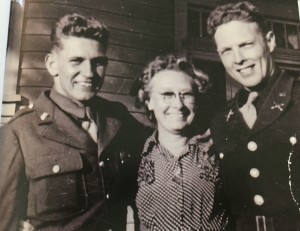Memorial Day’s Meaning
Use controls above or click here to open this Hometown Heroes podcast in a new window
90-year-old Doug Justus of Visalia, CA appears on episode #421 of Hometown Heroes, debuting May 28, 2016. Justus describes his own World War II service with the 81st Infantry Division, and also honors the memory of his brother, Bert.
A native of Indiana, Doug moved with his family of 8 to southern California when the Great Depression struck, forcing his father to find work elsewhere. Childhood activities for Doug and Bert included riding to the observatory, watching the annual Rose Parade, and selling doughnuts for their father, who was a chef. To help the family, the two brothers often gleaned the platforms of the train station for vegetables that workers left behind. The Justus family would later open a chicken dinner house where many notable actors, such as Randolph Scott, would dine as they passed through. Despite the severity of the Depression. Doug’s childhood was a happy one. “I didn’t realize we were poor.”
In this episode, you’ll hear Doug speak of his relationship with Bert. “He was my idol,” Doug said of his older brother. One day, while at the beach, someone stole their clothes, making them walk home barefoot in their swimsuits. When Bert enlisted in the Army in 1939 to operate artillery, it was hard for Doug because he loved Bert and spent so much time with him. The bond that these two brothers, and friends, possessed would prove to be unbreakable until death.
Doug was 16 years old when the Japanese attacked Pearl Harbor, and remembered when local Japanese families were sent away because of their ethnicity. “It was really not nice because they were good people.” Mr. Justus would become a warden, enforcing curfew in his neighborhood. In 1943, Doug was drafted by the War Department and sent to Camp Roberts to complete basic training. The hardest thing for him was “losing contact with my parents.” While he was there, Doug was selected for a special team. Initially, the military wanted to start a glider program, but they abandoned the idea due to the number of trainees who lost their lives in training. From Camp Roberts, Justus was transferred to Camp Stolman, where he and his comrades were trained with parachutes. One day, when Doug received permission to visit his parents, his division departed for combat, leaving Justus on his own. After months of solitude, in which he shot baskets and spent his days “hanging around”, the 81st Infantry Division arrived at the camp and offered him a position in their ranks.
Doug’s first exposure to the horrors of war came in New Caledonia, where the 81st was assigned to take belongings off of soldiers who had been killed in combat. “It was very bad,” Justus reflects, “it was my introduction into the war.” He was also hesitant to get to know his men because he feared that they would die. Justus would participate in missions on islands such as Peleliu, Okinawa, and the Philippines. Despite the terrible things that Doug saw, he never feared being killed, saying “I never thought I would die.” You’ll hear of the time that Justus was injured by a mortar blast and a fall from a boat, and how a Japanese man helped treat his arm. Doug also participated in the battle of Anguar, “Kind of a neat little battle,” in which the Americans secured the island for an airstrip.Throughout his service in the military, Doug believed that God had a plan for him, sparing his life several times in the face of battles that claimed the lives of many soldiers.
Following his return to the United States from Japan, Justus was reunited with his family, including Bert, who had already returned from Europe. Although the two never spoke of the war that they had both participated in, they spent much time “talking about life, and this-and-that.” Soon after, however, Bert departed for Korea to continue his service in the military. Doug continued to receive letters from Bert concerning his activities in Asia until Bert was captured and killed by the Chinese. Although the Justus family was unable to discover any details about their son’s whereabouts at the time, with the help of Mr. O’Brien, they were able to find out what happened to Bert, who courageously fought for his nation to the end.
Initially, Doug was not interested in thinking about Memorial Day, preferring to put such memories behind him, even declining an offer to go on an Honor Flight. After his children compelled him to go, however, he consented and “had the best time of his life.” Doug also had the chance to honor his brother by visiting the Tomb of the Unknown Soldier at Arlington National Cemetery and laying a wreath on the monument, saying, “Bert, you’re gone, but you’re not forgotten.”
Bert’s death has also inspired Doug to be more intentional in the relationships he has with his family and friends. He has always been a family-loving man, but even more so now, as he loves spending time with his kids and values their presence.
If you ever cross paths with this veteran, be sure to thank him for the price he paid so that this nation can remain free.
—written by Josiah Weimer

